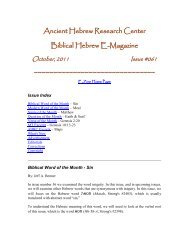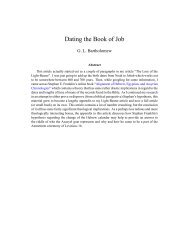My Name Forever - Ancient Hebrew Research Center
My Name Forever - Ancient Hebrew Research Center
My Name Forever - Ancient Hebrew Research Center
Create successful ePaper yourself
Turn your PDF publications into a flip-book with our unique Google optimized e-Paper software.
<strong>My</strong> <strong>Name</strong> <strong>Forever</strong> 15<br />
47. The vowel pattern of the word Yahweh vu vh identifies it as a verb of the Hiph’il, 47 the so-called<br />
“causative” conjugation, from the root Hei Vav Hei /v/u/v (to be) which would literally mean, "He Will<br />
Cause To Be." That's a problem, though, because the root Hei Vav Hei /v/u/v, like its counterpart Hei Yud<br />
Hei /v/h/v, has never developed forms in the Hiph’il conjugation. In other words, Yahweh vu vh, is a verb<br />
which does not exist in the <strong>Hebrew</strong> language. It is wholly unintelligible. 48 Even if, for sake of argument,<br />
Yahweh vu vh did represent a legitimate verbal form, the accent would be on the last syllable (Yahwéh<br />
vu vh) and his <strong>Name</strong> would mean, "He Causes To Be." However, the "I AM THAT I AM" of Exodus 3<br />
was communicated in the Kal conjugation, not the Hiph’il. Therefore, the meaning of his <strong>Name</strong> is not to<br />
be associated with the Hiph’il conjugation.<br />
48. As a <strong>Hebrew</strong> speaker, Josephus knew all these things. Unless he was guilty of promulgating<br />
disinformation, what he most likely meant to convey by, “Four vowels,” and what his contemporaries<br />
most likely understood when they heard it, was, “Four vowel-letters.” I believe the <strong>Hebrew</strong> original of<br />
The Jewish War would bear this out. From our vantage point, however, there is nothing in the words of<br />
Josephus which would lead us to understand that the “Four vowels” were pronounced as such, let alone as<br />
“Yahweh.” The structure and nature of the <strong>Hebrew</strong> language defy it.<br />
Yáhu-Hei "v" Uvh?<br />
49. On the basis of its purely imaginary nature, Yahweh should be disqualified from consideration as<br />
the actual pronunciation of the <strong>Name</strong>. As a Hiph’il verbal form or a word made up of all vowels it is a<br />
phantom. Its legitimacy ought to be seriously called into question. We know nothing, really, of its origin.<br />
The case for this particular pronunciation rests somewhat precariously on Greek and Latin manuscript<br />
evidence. The variants are many. The pronunciation of vuvh is reportedly represented in Greek and Latin 49<br />
as:<br />
Greek Latin<br />
3"ã, 3"@×, 3,Lf (Y’hó Yáhu, or Y’hu) IAHO (Y’hó)<br />
3"$X, 3"T@L,, 3"T@L,0, 3"T@L04 3"T@L," (Yahweh?) Jabe (Yahweh?)<br />
3"@L"\, 3"$"4 (Yahwai?) IAUE (Yahweh?)<br />
50. In reading some of these transliterations, it does seem like the sound “Yahweh” is what the<br />
transliterators were after, doesn’t it? This puzzled me for some time as “Yahweh” is nonsense in <strong>Hebrew</strong>.<br />
Then, one day, I came across this pseudo-scholarly statement about the <strong>Name</strong>:<br />
The uvh represents YAHU-, and the final v represents -EH or -WEH. 50<br />
47 See the paradigm for Lamed-Hei v"k verbs in section 24, p. 50 of the Analytical Lexicon.<br />
48 Perhaps this is the real reason some think of the <strong>Name</strong> as “heavenly.” If it isn’t a <strong>Hebrew</strong> word, it doesn’t have to mean<br />
anything in <strong>Hebrew</strong>, does it?<br />
49 The Sacred <strong>Name</strong> (Qadesh La Yahweh Press, 2002), pp. 108-111.<br />
50 C. J. Kostner: Come Out of Her <strong>My</strong> People (Institute For Scripture <strong>Research</strong>, 1998), p. 1.






